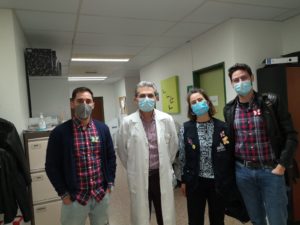When a baby with Butterfly Skin is born the whole family find themselves in a situation of confusion and desolation. Our aim is to be with families as soon as we receive notification from a hospital so that we can be on site to offer our support as quickly as possible at this very difficult time. Both the family and the medical team require immediate contact so that they can quickly become familiarised with the best possible level of care and treatments available.
During the month of April we visited 3 newborn babies. This is a fundamental role for our specialist health care team and mental health care support team.

Does this condition really exist? Will it be with them forever?” These are examples of the many questions that arise for families when we explain that their baby has Butterfly Skin. After the shock comes, disbelief, denial, and anger.
Common feelings which must be treated with patience, assertiveness and empathy, but above all we offer unconditional support:
“We offer them our support so that they can lean on us at any time and we encourage communication and understanding between family members and the medical team” said Saleta, one of our psychologists.
With regards to the medical team at the hospital we provide them with up to date advice on care and treatment and we give a very clear message: it is better to protect than to try and heal.


Next steps
In the days following the birth of a child we continue to work with families to help them through the process of acceptance. This can only be done by working closely with families: observing their individual situation and their response to the situation, checking their support network and noticing their strengths and weaknesses so that we can support them on a very personal level. These are incredibly upsetting and difficult times for families, but “Debra is always available to make things a little bit easier” said Saleta.
DEBRA Home visits
As well as visiting the newborn babies we have visited 6 families under the DEBRA at home project, to ensure help and support is provided in the home. These visits include both medical and mental health advice and we underline the importance of social care. It is so incredibly difficult to cope with a condition like Butterfly Skin, but this can be further aggravated by complicated socio-economic problems.
Our social worker Juanma “supports families and contacts medical professionals to try to improve their immediate situation” by providing advice on accessing national health service care and treatments as well as liaising with local social workers to make sure families are looked after and that they can access the help that they need.
